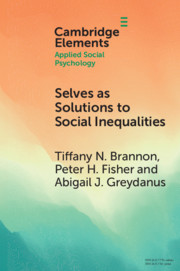Refine search
Actions for selected content:
1 results

Selves as Solutions to Social Inequalities
- Why Engaging the Full Complexity of Social Identities is Critical to Addressing Disparities
-
- Published online:
- 14 September 2020
- Print publication:
- 08 October 2020
-
- Element
- Export citation
